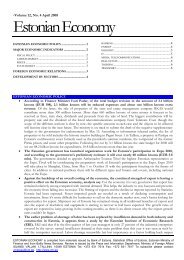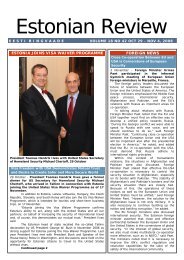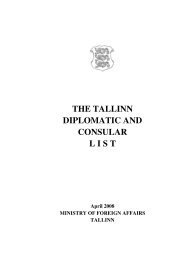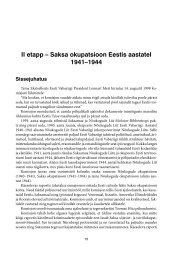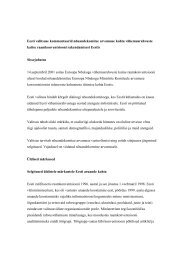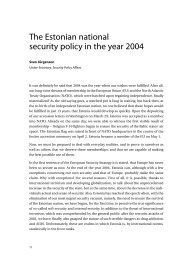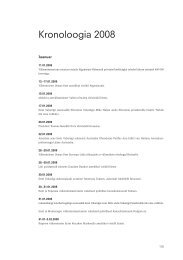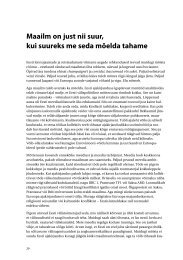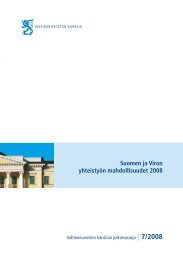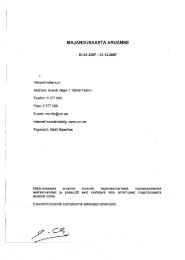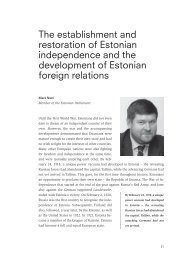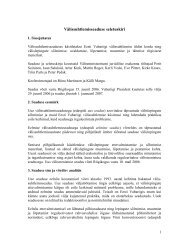Opportunities for Cooperation between Estonia and ... - Valitsus
Opportunities for Cooperation between Estonia and ... - Valitsus
Opportunities for Cooperation between Estonia and ... - Valitsus
You also want an ePaper? Increase the reach of your titles
YUMPU automatically turns print PDFs into web optimized ePapers that Google loves.
APPENDIX 7<br />
INTERNAL SECURITY<br />
One factor affecting the success of a country or region in global competition is<br />
how safe <strong>and</strong> secure it is to work <strong>and</strong> live there. Of equal importance with the<br />
security situation is how secure the citizens perceive their environment to be<br />
<strong>and</strong> what the projected security image is internationally. By world st<strong>and</strong>ards,<br />
<strong>Estonia</strong> <strong>and</strong> Finl<strong>and</strong> are regarded as relatively safe <strong>and</strong> secure countries.<br />
To a great extent, the problems of internal security are similar in <strong>Estonia</strong> <strong>and</strong><br />
Finl<strong>and</strong>. To manage them properly, cooperation is called <strong>for</strong>. Over the past 15<br />
years, the police, customs, the border guard <strong>and</strong> the rescue services of the two<br />
countries have considerably intensified their cooperation.<br />
Primarily, the framework <strong>for</strong> cooperation in the field of internal security is<br />
provided by the European Union. <strong>Estonia</strong> <strong>and</strong> Finl<strong>and</strong> have worked together<br />
to pursue joint objectives that we find important in order to enhance internal<br />
security in this region <strong>and</strong>, subsequently, the whole of the European Union.<br />
One of the cornerstones of police cooperation <strong>between</strong> <strong>Estonia</strong> <strong>and</strong> Finl<strong>and</strong><br />
has been the 1995 bilateral agreement on crime prevention. Compared with<br />
1995, the operating environment has changed so much that the agreement<br />
should be updated by placing greater emphasis on the electronic exchange of<br />
in<strong>for</strong>mation <strong>and</strong> shared access to electronic files. <strong>Estonia</strong>’s accession to the<br />
European Union <strong>and</strong> the Schengen area has decreased border checks <strong>between</strong><br />
the two countries. In order not to be compelled to compromise on general<br />
security, it is necessary to develop the regulatory basis to ensure more flexible<br />
cooperation <strong>between</strong> pre-trial investigators in gathering in<strong>for</strong>mation.<br />
The joint FINESTO working group of the <strong>Estonia</strong>n <strong>and</strong> Finnish police, established<br />
in 2000, seeks to improve efficiency in the exchange of operative in<strong>for</strong>mation<br />
to combat organized crime. The first joint teams of criminal investigators were<br />
appointed by <strong>Estonia</strong> <strong>and</strong> Finl<strong>and</strong> in 2007. Joint investigative teams are among<br />
the latest instruments of police cooperation within the European Union. Aside<br />
from the National Bureaus of Investigations of the two countries, the joint teams<br />
have included customs officers, prosecutors <strong>and</strong> local police departments. The<br />
experiences gained by <strong>Estonia</strong> <strong>and</strong> Finl<strong>and</strong> from joint investigators’ teams have<br />
been positive. Additionally, the criminal police of the two countries have carried<br />
out several other police operations by employing other <strong>for</strong>ms of cooperation in<br />
which confidential relations <strong>between</strong> the organizations are truly important.<br />
45





